View in other NatureServe Network Field Guides
NatureServe
Montana
Utah
Wyoming
Idaho
Wisconsin
British Columbia
South Carolina
Yukon
California
New York
Large-fruited Kobresia - Kobresia sibirica
Other Names:
Kobresia macrocarpa, Carex borealipolaris
State Rank Reason (see State Rank above)
Rare in Montana. Only known in the state from a small area of the Beartooth Plateau.
- Details on Status Ranking and Review
Population Size
Score2-3 - Very Small to Small: Population size is imprecisely known but is believed to be <10,000 individuals.
Range Extent
Score1 - Peripheral, Disjunct or Sporadic Distribution in MT: Widespread species that is peripheral, disjunct or sporadically distributed within MT such that it occurs in <5% of the state (<7,500 sq. miles or the combined area of Beaverhead and Ravalli Counties) or is restricted to 4-5 sub-basins.
Area of Occupancy
Score3 - Very Low: Generally occurring in 3 or fewer Subwatersheds (6th Code HUC’s).
Environmental Specificity
Score2 - High: Species is restricted to a highly specialized and limited habitat and is typically dependent upon unaltered, high-quality habitat (C Values of 8-10).
Trends
Score0-3 - Population trends are unknown.
Threats
Score0-1 - Low to Medium.
Intrinsic Vulnerability
Score0-1 - Low to Moderate Vulnerability.
Raw Conservation Status Score
Score
8 to 14 total points scored out of a possible 19.
General Description
Stems 5–15 cm. Leaves inrolled, ca. 0.5 mm wide; basal bladeless. Inflorescence 1–2 cm long, a solitary spike; bracts 5–6 mm long. Spikelets: upper male, 1-flowered; lower bisexual, 1- to 3-flowered. Perigynia light brown, 3.5–5 mm long. Achenes 2.5–4 mm long (
Lesica et al. 2012. Manual of Montana Vascular Plants. BRIT Press. Fort Worth, TX).
Phenology
Fruit matures in late July-August.
Diagnostic Characteristics
This species could be confused with Kobresia bellardii, Carex elynoides, or Carex scirpoidea, which have narrower spikes, usually less than 4 mm wide. The former two species occur in drier habitats.
Species Range
Montana Range
Range Descriptions
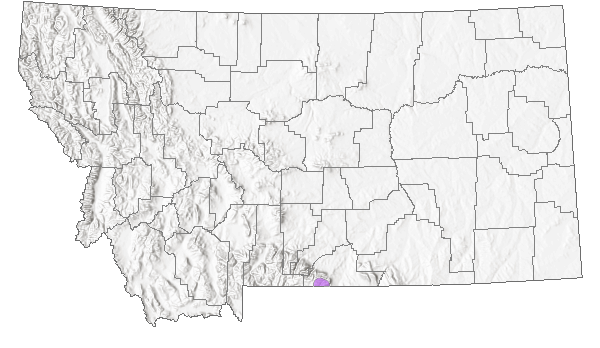
 Native
Native
Range Comments
Circumpolar south to CO (Lesica et al. 2012. Manual of Montana Vascular Plants. BRIT Press. Fort Worth, TX).
Observations in Montana Natural Heritage Program Database
Number of Observations: 6
(Click on the following maps and charts to see full sized version)
Map Help and Descriptions
Relative Density
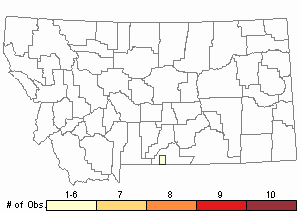
Recency
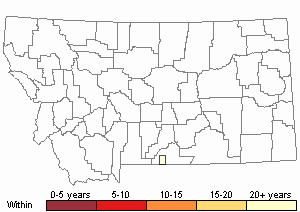
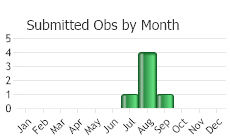
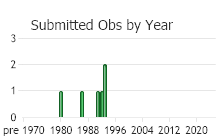
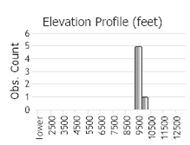 (Observations spanning multiple months or years are excluded from time charts)
(Observations spanning multiple months or years are excluded from time charts)
Habitat
Moist tundra, solifluction slopes, and gravelly lake shores in the alpine zone.
National Vegetation Classification System Groups Associated with this Species
Alpine
Alpine - Vegetated
Wetland and Riparian
Alpine Riparian and Wetland
Wet Meadow and Marsh
Stewardship Responsibility
References
- Literature Cited AboveLegend:
 View Online Publication
View Online Publication Lesica, P., M.T. Lavin, and P.F. Stickney. 2012. Manual of Montana Vascular Plants. Fort Worth, TX: BRIT Press. viii + 771 p.
Lesica, P., M.T. Lavin, and P.F. Stickney. 2012. Manual of Montana Vascular Plants. Fort Worth, TX: BRIT Press. viii + 771 p.
- Additional ReferencesLegend:
 View Online Publication
View Online Publication
Do you know of a citation we're missing? Fertig, W. and M. Bynum. 1994. Biological report on the proposed Twin Lakes Research Natural Area. Unpublished report to the Shoshone National Forest. Wyoming Natural Diversity Database, Laramie, Wyoming. 33 pp. plus appendices.
Fertig, W. and M. Bynum. 1994. Biological report on the proposed Twin Lakes Research Natural Area. Unpublished report to the Shoshone National Forest. Wyoming Natural Diversity Database, Laramie, Wyoming. 33 pp. plus appendices. Lesica, P. 1993. Vegetation and flora of the Line Creek Plateau area, Carbon County, Montana. Unpublished report to USDA Forest Service, Intermountain Research Station. Montana Natural Heritage Program, Helena, Montana. 30 pp.
Lesica, P. 1993. Vegetation and flora of the Line Creek Plateau area, Carbon County, Montana. Unpublished report to USDA Forest Service, Intermountain Research Station. Montana Natural Heritage Program, Helena, Montana. 30 pp. Lesica, P., M.T. Lavin, and P.F. Stickney. 2022. Manual of Montana Vascular Plants, Second Edition. Fort Worth, TX: BRIT Press. viii + 779 p.
Lesica, P., M.T. Lavin, and P.F. Stickney. 2022. Manual of Montana Vascular Plants, Second Edition. Fort Worth, TX: BRIT Press. viii + 779 p.
- Web Search Engines for Articles on "Large-fruited Kobresia"





